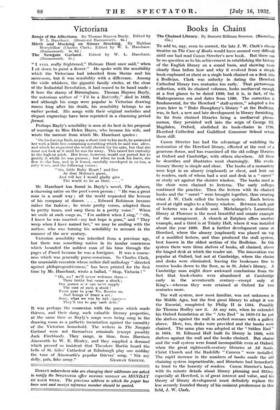Victoriana
Songs of the Affections. By Thomas Haynes Bayly. Edited by W. L. Hanchant. (Desmond Harmsworth. . 68.) Mirth and Mocking on Sinner Stocking. By Malthus Merryfellow (Charles Clark). Edited by W. L. Hanchant. (Harmsworth. 3s. 6d.) The Newgate Garland. Edited by W. L. Hanchant. (Harmsworth. 3s.) " I FEEL really frightened," Holman Hunt once said," when I sit down to paint a flower." He spoke with the sensibility which the Victorians had inherited from Sterne and his successors, but it was sensibility with a difference. Among the virile whiskers, the gigantic family circles, at the close of the Industrial Revolution, it had ceased to be hand made ;- it bore the stamp of Birmingham. Thomas Haynes Bayly, the notorious author of " I'd be a Butterfly," died in 1839,- and although his songs were popular in Victorian drawing rooms long after his death, his sensibility belongs to an earlier period. His songs with their original melodies and elegant engravings have been reprinted in a charming period, formal.
Perhaps Bayly's sensibility is seen at its best in his proposal of marriage to Miss Helen Hayes, who became his wife, and wrote the memoir from which Mr. Hanchant quotes :
" On his leaving Bath, to pay a short visit to his uncle, he presented her with a little box containing something which he said was alive, and which he requested she would cherish for his sake, but that she must not look at it until he was far away. This raised her curiosity to the higinst pitch. Her lover, however, would not permit her to gratify it whilst ho was present ; but when he took his leave, she flew to the box, and in it found, carefully enveloped in co ,ton, a ruby heart, and the following verses :
" Go, little Ruby Heart ! and live As dear Helena's guest,
And tell her I would gladly give
The world to be as blest. . . . "
Mr. Hanchant has found in Bayly's novel, The Aylmers, a charming satire on the poet's own person : " He was a great man in a small way ; all the world requested the honour of his company at dinner. . . . Edward Robinson became rather the fashion ; he wrote pretty verses, adapted them to pretty tunes, and sang them in a pretty voice." When we smile at such songs as, " I'm saddest when I sing," " Oh, I knew he was married—my last hope is gone," and " They weep when I have named her," we may be smiling with the author, who was turning his sensibility to account in the manner of the new century.
Victorian sensibility was inherited from a previous age, but there was something native in its insular coarseness which hounded the noblest man of his time through the pages of Punch because he was a foreigner. It was a coarse- ness which was generally purse-corscioim. So Charles Clark, the unamiable eccentric whose rather dull anthology " directed. against philoprogenitiveness," has been printed for the first time by Mr. Hanchant, wrote a ballad, " Stop, Victoria ! "
" Oh, no ! we'll never welcome them— Their births but cause a shock ; Our purses n•- w can ne'er supply The coat of such a stock !
Froth year to year Vie. flurries us, And brings of brats a set ; Soon, what we win by toil—again- They'll tax to pay each debt."
It was perhaps the connexion with the purse which made thieves, and their slang, such valuable literary properties, at the same time as Bayly's songs were being sung in the drawing room as a pathetic incantation against the carnality of the Victorian household. The writers in The Newgale Garland were not themselves criminals (except possibly Jack Fireblood). _ They range, in time, . from Harrison Ainsworth to W. E. Henley, and they supplied a demand which proved so insistent that Theodore Martin heard the bells of St. Giles' Cathedral at Edinburgh play one midday the tune of Ainsworth's popular thieves' song, " Nix my


































 Previous page
Previous page